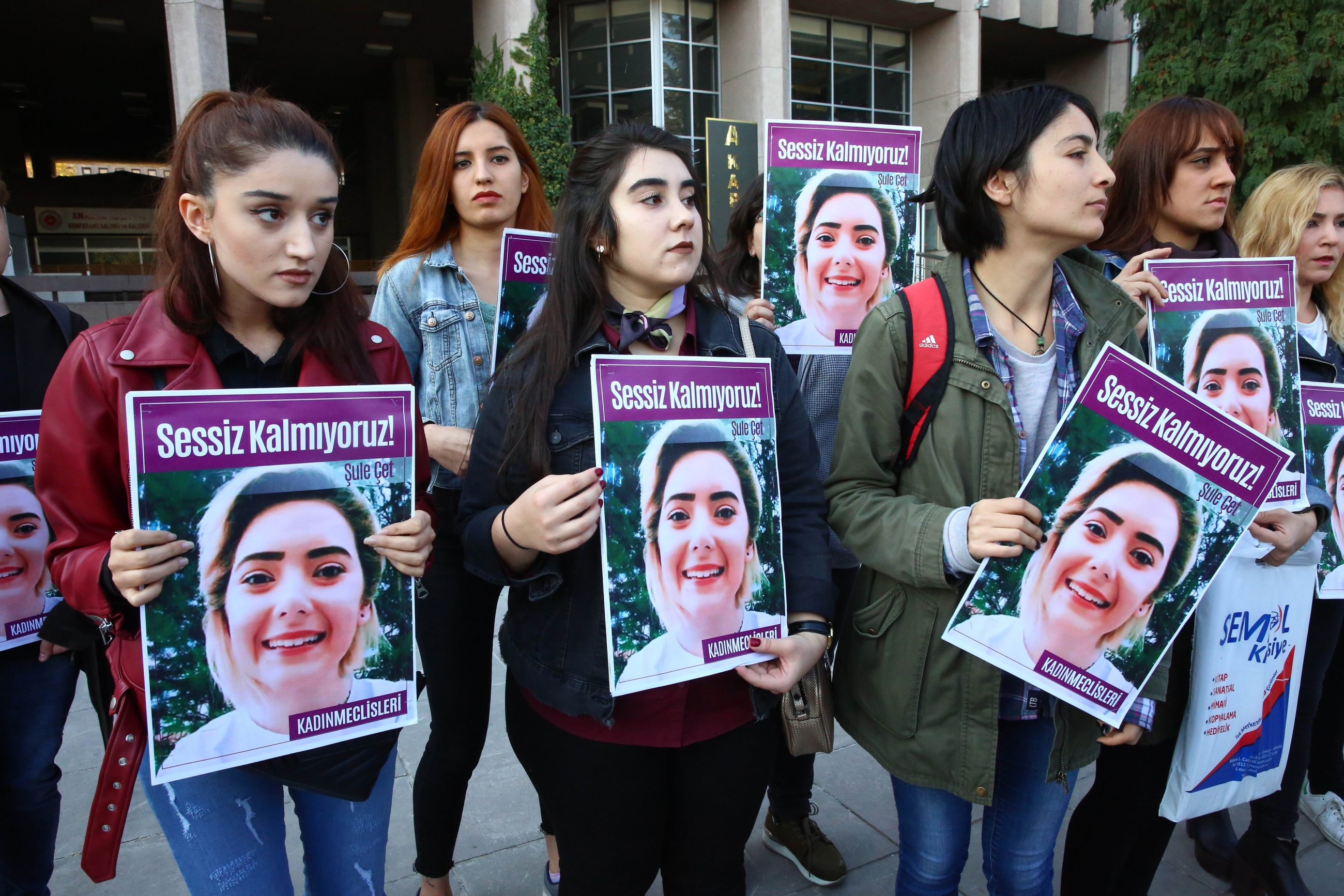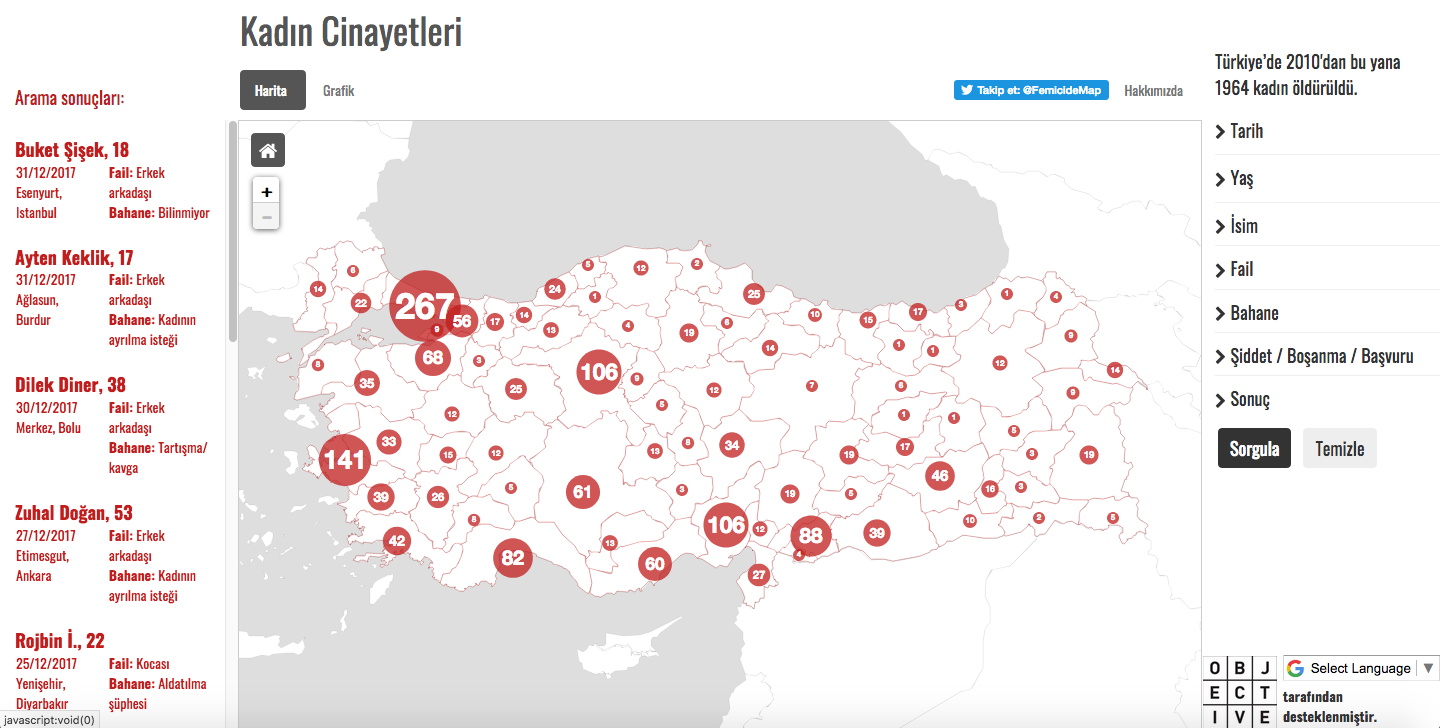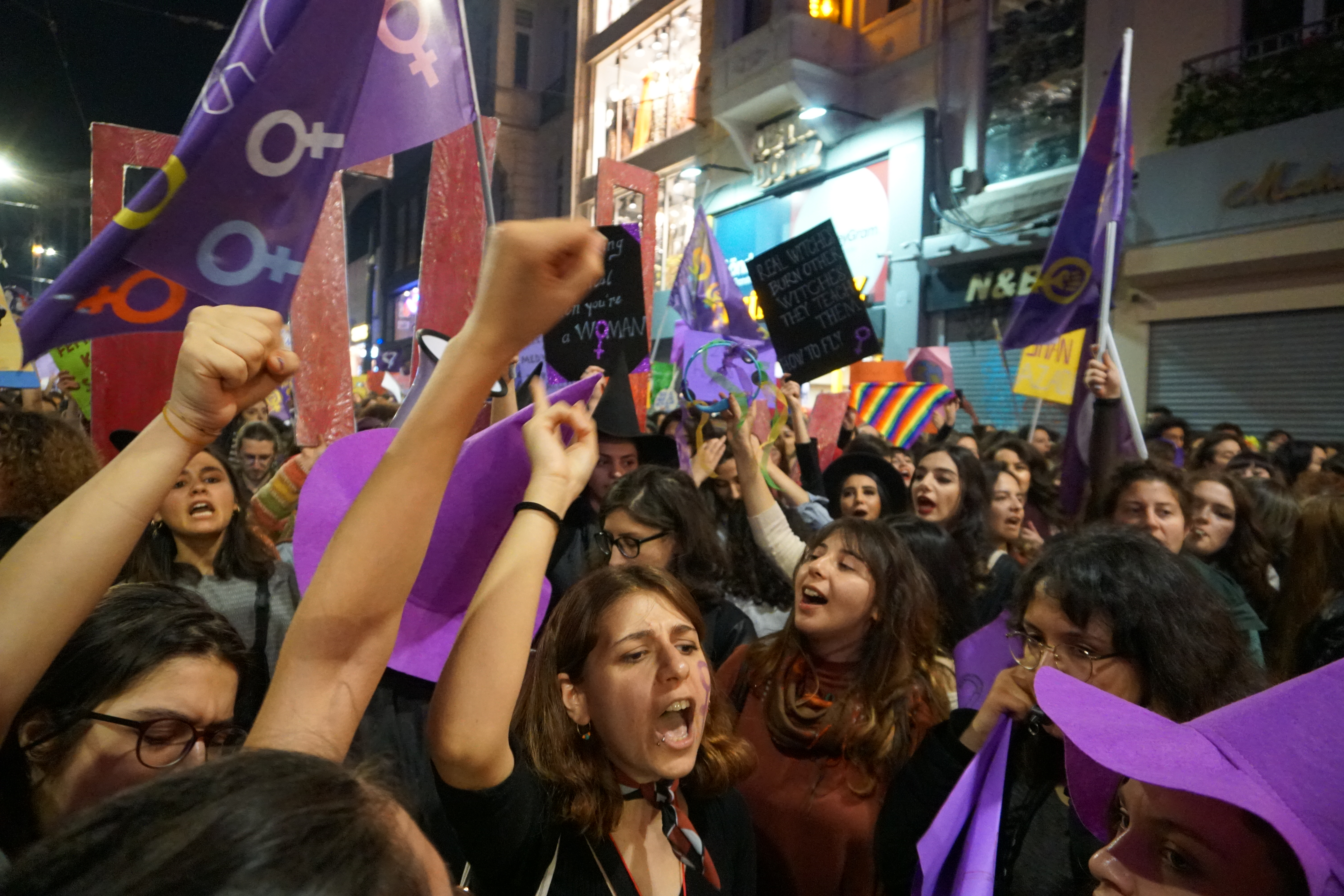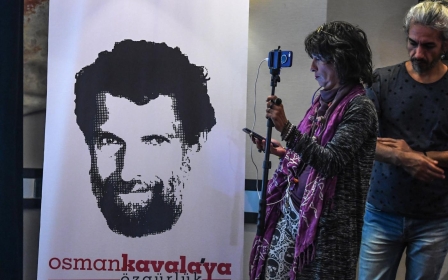'We want justice': Turkish activists push for new investigations into women's 'suspicious' deaths

An ongoing murder trial following the death of a student in Ankara has given new momentum to a campaign calling on Turkish authorities to open investigations into the deaths of other women deemed to have died in suspicious circumstances.
The body of 23-year-old Sule Cet was found below the balcony of a plaza in Turkey's capital last May.
She had fallen from an office belonging to her boss, and she had spent the evening there with him and his friend the day before her death.
Initially, Cet's death was ruled as suicide by the local prosecutor. But right from the beginning, friends and supporters suspected this was not the case.
Evidence subsequently emerged implying that Cet had been concerned for her safety hours before her death.
New MEE newsletter: Jerusalem Dispatch
Sign up to get the latest insights and analysis on Israel-Palestine, alongside Turkey Unpacked and other MEE newsletters
“I can’t get out of here. The man is obsessed with me. He won’t let me go. I wish I hadn’t come," she wrote in a text to a friend.
Following a months-long campaign, her friends and family finally managed to have the original prosecutor dismissed and a new one assigned, who immediately opened a murder case. Cet's boss and his friend were subsequently arrested last July and charged with her rape and murder.
At a first court hearing in February, the defendants denied the charges. But activists seeking to raise awareness about femicide in Turkey hope that the fact of the reopening of the trial could lead to further investigations being re-opened.
'We want justice'
Last year, on 28 February, 26-year-old Aysun Yildirim was found dead after falling from the third floor of the office building where she worked, in the Istanbul suburb of Sefakoy.
Six months later, the Bakirkoy prosecutor's office ruled that her death had been a suicide.
'We read about these criminal cases as third-page news and then they just get lost'
- Ceyda Ululayka, Femicide Map
Her family had always said they regarded her death as suspicious, however, and are now pushing for a new investigation into the circumstances around her death in the wake of Cet's case being re-opened.
"We want what is right, we do not want anything else," said Yildirim's sister Nurgal, speaking at a rally in Istanbul on the anniversary of her death.
"We want justice for Aysun!"
'Suspicious' deaths
According to the campaign group We Will Stop Femicide, 440 women were killed by men in Turkey in 2018. Out of these, they classified 30 percent as "suspicious".
"Women are murdered for wanting to make decisions about their own lives. Women are murdered for trying to express themselves. Women are murdered for wanting to get divorced, for wanting to work, for wanting to leave their partners," said Fidan Ataselim, the group's secretary-general.
She said the many similarities between the cases of Cet and Yildirim had given strength to We Will Stop Femicide's campaign to have the latter case re-opened.
"Aysun Yildirim’s family also appealed to us after the case was closed as suicide," she told Middle East Eye.
"They said that their daughter did not commit suicide. They said the suspects had contradictory statements and there were contradictions in the evidence."
According to BBC Turkish, Yildirim had spoken to her mother the same evening and nothing wrong had been noticed.
One piece of evidence in the police report which her family consider especially significant is the absence of Yildrim's fingerprints on the window she was alleged to have jumped from.
A similar lack of fingerprints was also used in the reassessment of Cet's case.
Leyla Suren, Yildirim's lawyer, has also criticised the fact that her colleague's phone records had not been requested and that no examination had been made into whether there was evidence of sexual assault.
"Why aren't there fingerprints if Aysun jumped out that window? The report says that Aysun left no fingerprints," Suren told Milliyet newspaper in December.
"There are many flaws and contradictions in this file."
Even if Yildirim's family succeeds in re-opening the case, they likely face a rough and unpleasant road ahead.
In Cet's case, the defence team for Cagatay Aksu and Berk Akand - her boss and his friend respectively - attempted to paint a picture of the 23-year-old as a dishonourable woman.
This included discussing her sexual history and citing a 70-year old text that argued "if a woman agrees to drinks with a man in a secluded place, it means she consents to sexual relations."
Cet's lawyer Umur Yildirim said in response that the use of the text, a book on forensic science from the 1950s, was "unacceptable" and outdated in the modern context.
The next court hearing is on 15 May.
Femicide epidemic
Campaigners calling for justice and accountability in similar cases say that their cause has been aided by the rise in recent years of a strong feminist movement which is no longer willing to remain silent about violence against women or dismiss their murder as "honour killings" as they had been in the past.
The 2015 murder of Ozgecan Aslan, a 19-year old university student killed by three men during an attempted rape on a bus in Mersin, was one of the biggest catalysts for a new wave of protest for women's rights.
Initiatives like the We Will Stop Femicide platform and the Women's Councils helped to promote the need for a wider discussion about women's rights in Turkey.
Ceyda Ululayka is the creator of the Femicide Map, an interactive map which documents the killing of women across the country.
She told MEE that she created the map in order to highlight how widespread the problem is and to make sure women's deaths were not simply written off as one-shot freak occurrences.
"In Turkey, at least one woman was killed by a man per day. We read about these criminal cases as third-page news and then they just get lost," she explained.
"We hear about some numbers but we do not think much about how, where, when, by whom or on which pretext? Were they subjected to violence before the murder? Did they apply for protection? So my idea was to gather all femicide cases and create a database that shows all these details."
She said that the data for the map was based on information gleaned from open source news reports, after her attempts to press the government for figures hit a brick wall.
Right to Information requests made to the Ministry of Justice, gendarmerie, police stations, and Ministry of Interior yielded no results.
Despite this, she said that the solution to violence against women in Turkey was "hiding in the data".
"In order to create preventative policies, we need to examine femicide cases in a detailed way. So here in this map, we see that at least 403 women were killed during break-up or divorce processes.
"The map also indicates that at least 246 women had reported threats to the authorities, while 369 murders were preceded by violence or threats," she said.
"These numbers basically say that we need much more protection mechanisms for women. All we need is to accept that femicide is preventable."
MEE contacted the Justice Ministry to ask what was being done to encourage more investigations into suspicious deaths, but no response was forthcoming at the time of publication.
'No woman will march alone'
International Women's Day on 8 March saw massive women-only marches across the country - despite bans imposed by the government.
Among the wide coalition of organisations and causes on displays, the images of Sule Cet, Rabia Naz, Aysun Yildirim, Esin Gunes, Ozgecan Aslan and other victims and suspected victims of male violence were ubiquitous.
The struggle they face to be heard in a high patriarchal society is still hard, though, and the government is less than sympathetic.
Following the march in Istanbul, Turkish President Recep Tayyip Erdogan - a man who has previously stated his belief that "women are not equal to men" - slammed the demonstrators for disrespecting the Islamic call to prayer.
Despite the fact that Turkey was one of the first countries to sign the Istanbul Convention in 2011 - which aims at preventing violence against women across Europe - the country was ranked 137 out of 149 countries in the World Economic Forum's 2018 gender gap index.
A new social attitudes survey of Turkish youth released by the Konda agency suggested that views on the roles of women in work and in the family have become less conservative in the past 10 years - but the views of the state and media still stifle the environment for change, according to activists.
"When an official declares that women and men aren’t equal, the offender at court, the husband at home, the male boss at work or the male partner will think they can do anything they want to a woman and that they have the right to do so. Sadly, patriarchy causing femicides has been fed in Turkey," said Ataselim.
"However, there’s a strong women’s rights movement that marches against patriarchy. As long as we exist, no woman will march alone against femicide and violence."
Middle East Eye delivers independent and unrivalled coverage and analysis of the Middle East, North Africa and beyond. To learn more about republishing this content and the associated fees, please fill out this form. More about MEE can be found here.







